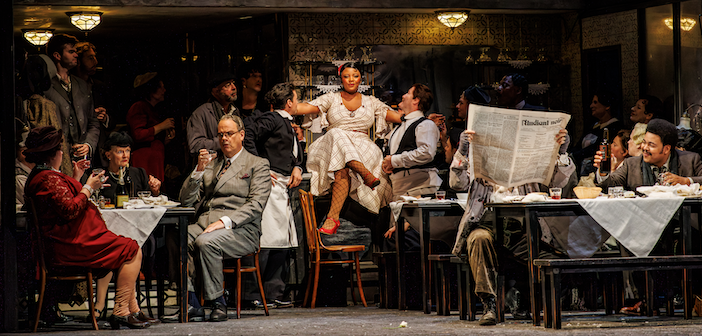English National Opera’s new season kicks off with a homage to Puccini, marking 100 years since the composer’s death. Two of his operas – and they couldn’t be more different – have opened this September and, first up, it was La Bohème. Jonathan Miller’s 2009 production has been revived, the setting is the 1930s and leaves us in no doubt that being a Bohemian between the wars was no laughing matter. The winter in Paris is freezing, no one has any money, hunger is normal, illness is lurking.
The four young men who share an icy attic are nevertheless boisterous as puppies. When they do have an unexpected windfall, they immediately blow it on wine in their local, Café Momus. At home, they rough-house, sword fight with baguettes and play the fool: a painter, a poet, a musician and a philosopher and, to a man, ready to starve for the sake of their art. Into this band of brothers steps Mimi (Nadine Benjamin in thrilling voice), a penniless and (as we are to learn) consumptive seamstress.
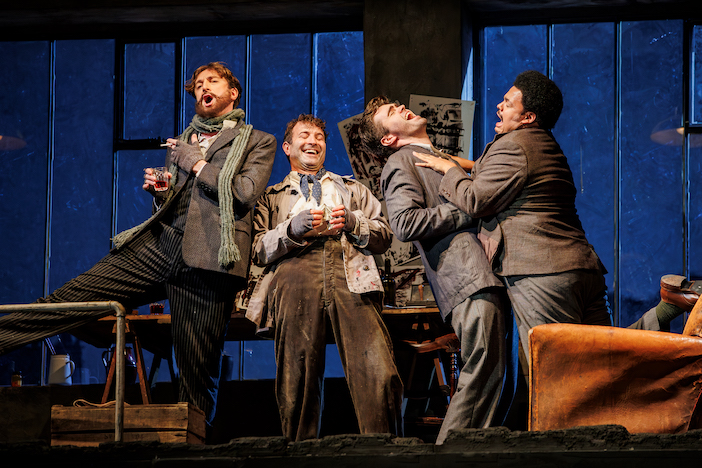
Dingle Yandell, Charles Rice, Patrick Alexander Keefe, Joshua Blue in ENO’s La Boheme 2024
In one of opera’s most familiar scenes, her tiny, frozen hand is grasped by the poet, Rodolfo (Joshua Blue, passionate at his ENO debut), and they immediately fall in love. It is, perhaps, one of Puccini’s most extraordinary skills that he is able to draw these characters so quickly and make them so instantly real that, in Amanda Holden’s chatty translation of the libretto, they seem in many ways just like us. His ultimate skill is, though, that soaring music that, under Clelia Cafiero’s baton, swells magnificently, drowning us in great tides of emotion.
And there are so many emotions at play here. Of course, tragedy is inevitable but along the way there are plenty of glorious, often funny, moments. When the landlord, Benoit (a great comic turn by Paul Sheehan) comes for his rent the artists dupe him shamelessly. In Café Momus, Musetta (an irresistible Vuvu Mpofu) flirts with Marcello (a show-stealing Charles Rice) while leaving her hapless lover (Andrew Tinkler, a shoo-in for Basil Fawlty) to pay the bill. Crowds fill the stage to watch a band pass by, children pester the travelling sweet seller. It’s a busy stage and, indeed, a busy set that revolves again and again, pushed by stagehands into ever-changing configurations.
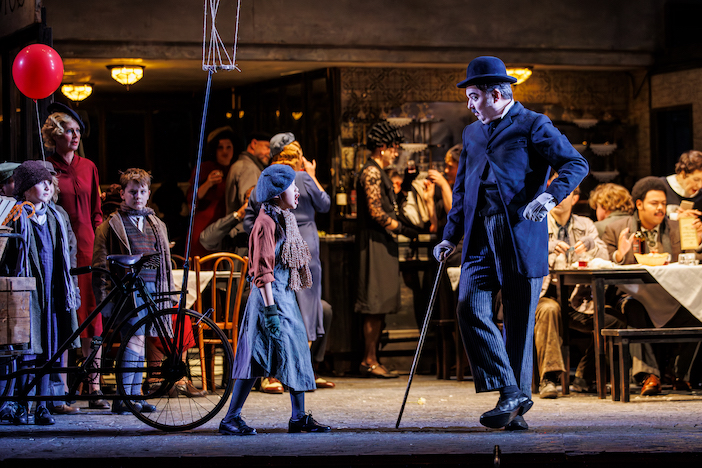
Snow falls on all the lovers’ misunderstandings. As Mimi nears her end, back in the attic, the masks drop and there is raw emotion everywhere. Dingle Yandell as Colline is particularly fine here as he prepares to sell his overcoat to buy Mimi’s medicine. Rodolfo crumbles before our eyes and Nadine Benjamin’s smiling Mimi fades quietly away. It works for me every time – but clearly not for everyone. In the row in front of me, three women spent a great deal of the evening on their phones, one even taking a picture (with flash) of the performance. Where are the ushers when you need them?
There were just two performances of Suor Angelica, both on the same evening as this is an opera that’s just one hour long. Conceived by Puccini as one of three short operas to play together as a musical triptych, it is unusual to see it standing alone. It is, though, inarguably, a small masterpiece.
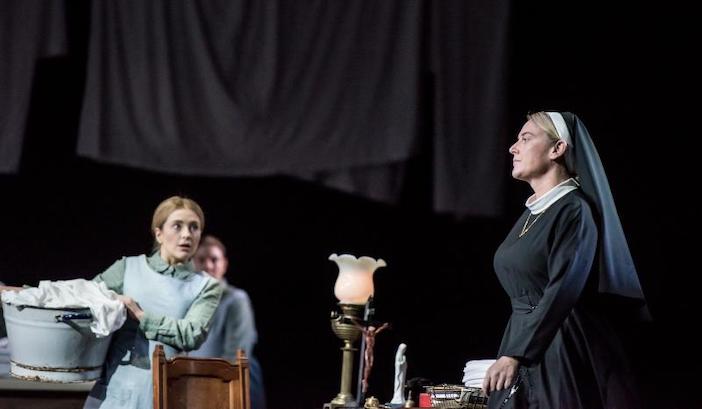
Director Annilese Miskimmon has updated the action to Ireland in the 1960s – and it couldn’t be more apposite. This is the harrowing tale of a young woman who has been confined to a convent, out of sight since her child was born out of wedlock. The child has, of course, been taken away from her and she longs for news of him. Her home is not just a nunnery but one of the infamous Magdalen Laundries, places where young “fallen” women provided slave labour, forever separated from their children. In this semi-staged production, the women wash and bleach the sheets that hang above them drying, forever damned to cleaning other peoples’ dirty linen.
As you would expect, set in a nunnery, Suor Angelica is Puccini’s only all-female opera. The setting means, too, that there is religious as well as secular music throughout – indeed, it opens with an off-stage Ave Maria sung by the nuns in their chapel. This is some of Puccini’s most lyrical and ethereal music, beautifully played by the ENO Orchestra under yet another female conductor, Corinna Niemeyer, and it reminds us just how strong this company is with its fine chorus – and not just vocally. Last night they were revellers in La Boheme, now they are broken and grief-stricken, each of them individually defined. There are several stand-out performances here – Alexandra Oomens as Genevieve, Sarah-Jane Lewis as Sister Dolcina, Madeleine Shaw as the Abbess.
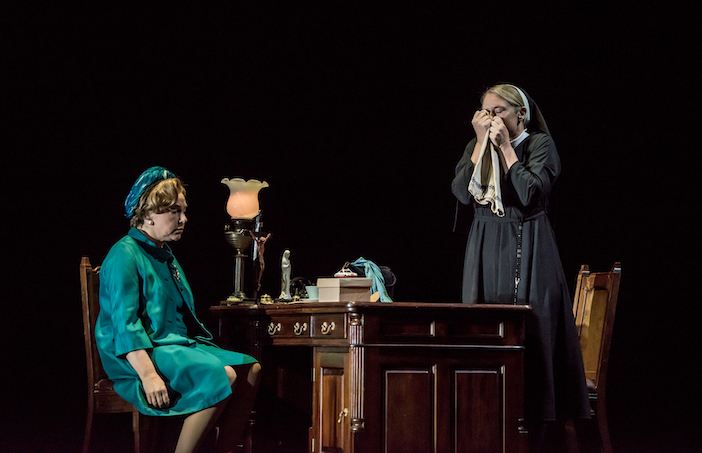
The focus shrinks in the second half of the opera when Angelica has a visitor, the aunt who has condemned her to virtual imprisonment in the first place. As the Baroness, Christine Rice is a steely vision of moral righteousness, dressed from head to toe in violent turquoise and pleased to twist the knife, informing Angelica that her son died two years earlier. ENO stalwart, Rice gives a commanding performance. As Angelica, Sinead Campbell-Wallace is magnificent. This is a short opera, but a huge part. Campbell-Wallace soars vocally and is utterly convincing, as overcome by grief, she takes her last, faith-defying decision.
We can only hope there’s another opportunity to see this opera next season though, as ever, the fate of the ENO at the Coliseum is still hanging in the balance. Its move to Manchester is still pressing ahead but London cannot do without this magnificent company either. The capital would be so much the poorer without it.
La Boheme runs at the London Coliseum until 19th October. For more information, performance dates and bookings, please visit www.eno.org.
La Boheme photos by Lloyd Winters, Suor Angelica photos by Genevieve Girling (courtesy of ENO)

